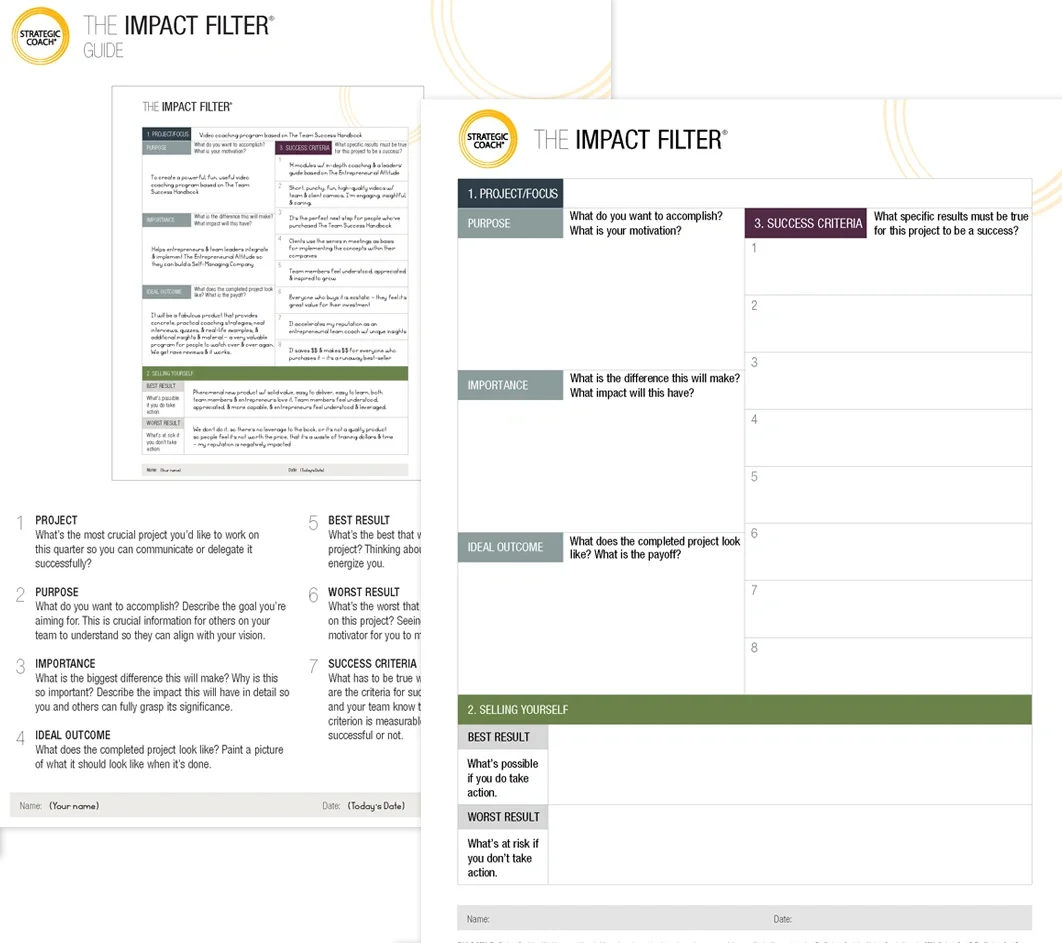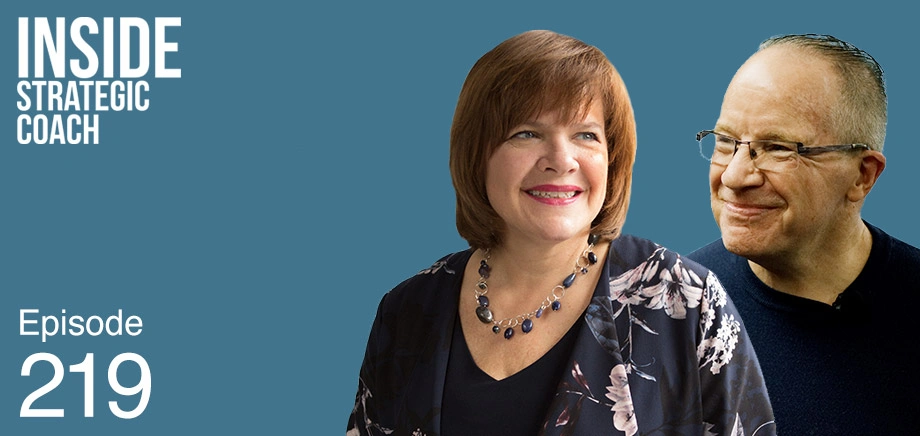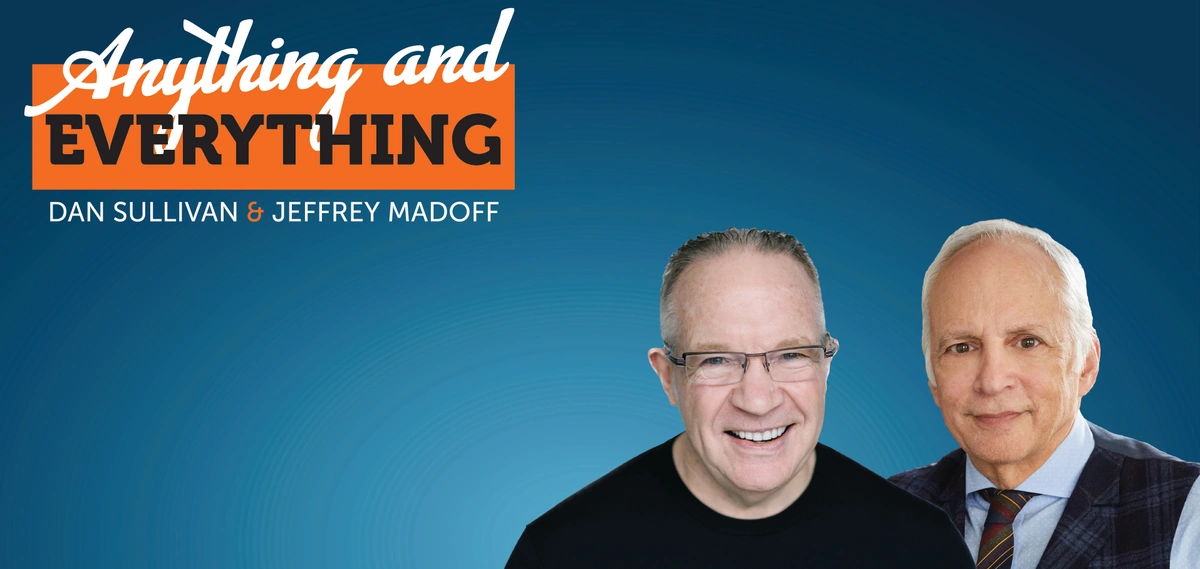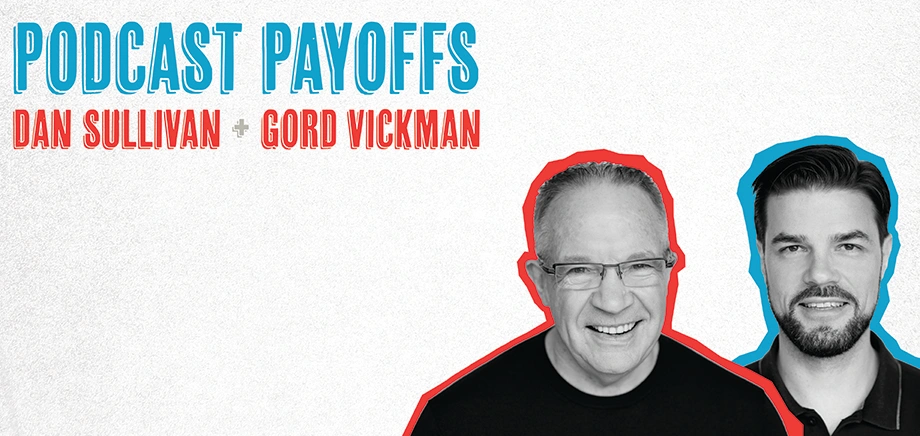The Right Way And The Dangerous Way To Think About Ambition
December 24, 2024
Hosted By
 Dan Sullivan
Dan Sullivan
 Shannon Waller
Shannon Waller
Entrepreneurs need to be ambitious. But what happens when you achieve your ambition? In this episode, Dan Sullivan and Shannon Waller explain the drawbacks of having ambition as a destination and describe the incredible benefits you can expect when you see ambition as a capability.
Here’s some of what you’ll learn in this episode:
- Why Dan sees ambition as an internal capability.
- Measurements you should be making every day.
- What’s made Dan’s life simpler over time.
- How Dan gifts Strategic Coach® members extra years to their entrepreneurial lives.
- What you need to avoid to be continually ambitious, and why.
Show Notes:
- Ambition is a capability, not a destination.
- Simply by continually improving your ambition each day, you’ll experience exponential growth over time.
- Dan Sullivan feels more ambitious at 80 than he did at 50.
- To strengthen your ambition, it’s important to measure your daily accomplishments and strive for continal growth.
- You can measure your progress not just in achievements, but in the ability to accomplish more in less time with greater impact.
- Ambition itself should be measured in terms of increased capability and confidence.
- Simplifying life by eliminating distractions (like television) can reclaim valuable time for personal development and ambitious pursuits.
- Surrounding yourself with growth-oriented individuals, often younger, can inspire and fuel your ambition.
- To be continually ambitious, there are three things you should avoid: celebrity, retirement, and legacy.
- It’s important to focus on being useful and impactful in the present rather than worrying about future legacy.
- Viewing ambition as a capability can also help you feel more fulfilled personally—and have a greater impact on your community.
- Every day, ask yourself what you can do so that you’re more ambitious tomorrow.
- Being around people who aren’t invested in growth is an obstacle to your ambition.
Resources:
Who Not How by Dan Sullivan and Dr. Benjamin Hardy
Episode Transcript
Shannon Waller: Hi, Shannon Waller here and welcome to Inside Strategic Coach with Dan Sullivan. Dan, you said something the other day and just reiterated on our last podcast that I found really interesting. And you made a statement that there's a big difference between ambition as a destination and ambition as a capability. So let's talk about ambition. What is it? What's the best way to use it? What's the best way to think about ambition? I'm curious.
Dan Sullivan: Well, first of all, there's a way that I've read about it and listen to other people talk. I have an ambition to do this. I have an ambition to do that. And it doesn't really relate to me at all. So the one thing I noticed that I've always been ambitious, but the way that other people talk about ambition doesn't connect with my experience of being ambitious. So that's why I was interested, because when you achieve what your ambition is, what happens then?
Shannon Waller: That's a good point. Do you just stop?
Dan Sullivan: Well, my experience, it is that they do stop. And my sense is that they actually start stopping before they actually get to the destination. So destination means that you're there. Okay, so what happens after you're there? Now what? Now what? So I don't experience. I experience it as an internal capability. And my ambition is to always be more ambitious.
Shannon Waller: Your ambition is to always be more ambitious. Say more about that.
Dan Sullivan: I can repeat it. It's a way of being. It's not a destination. It's just a way of being. At age 80, which I am, I'm far, far more ambitious now than I was when I was 50. And I was ambitious then. I mean, I was at my most ambitious at 50, but at 80, I'm way beyond the level of ambition that I had. That would be 1994. So it's a capability. I don't see it as an external destination outside myself. It's an internal mindset. But it's also measured in terms of increased capability and confidence.
Shannon Waller: I'm so intrigued, Dan. And thinking of ambition as a skill, as a capability is really interesting because then I'm like, okay, how does it get stronger? What are the tools that you use? What obstacles do you overcome? I'm sure there's a team of Who’s around you that support this. I'm like, how does one develop or, as you're listening to this, our audience, ambition is part of how you're wired, like there's some natural spark there, you wouldn't be listening. But how do you grow that? How do you expand that? I'm intrigued by that idea, to have it actually as a skill.
Dan Sullivan: Well, you know, it involves constant improvement, you know. I measure things every day of things that yesterday I wanted to do today, which hadn't happened yet, and then it happens. And so I constantly feed it improvement. I'm doing this, I'm doing this, I'm doing this. I'm getting more done in less time. I'm having greater impact with less effort. One characteristic of it is that I'm a lot simpler as a person, if I measure back to, you know, 30 years ago. I'm much simpler. My life was a lot more complicated. I had a lot more distractions. I had a lot more things that bothered me. And I think what happens is because being more ambitious is the goal, then anything that would interfere with me being more ambitious has to go. You know, it has to be eliminated.
Shannon Waller: Thank you. I think that's what I was trying to get my fingers on. You've just stripped away anything that …
Dan Sullivan: For example, I'm in my seventh year now of not watching any television at all. People say, well, you watch Netflix. I say I haven't watched any television at all. I haven't turned on the television. We have a television in Toronto that's sort of complicated. I wouldn't even know how to turn on the television right now.
Shannon Waller: Well, I will tell you, because I've stayed at your house and the service is disconnected. You literally don't have access to television anymore in Toronto or Chicago.
Dan Sullivan: I did not know that.
Shannon Waller: No, you wouldn't, actually.
Dan Sullivan: That's something I never would have found out.
Shannon Waller: No, you would not.
Dan Sullivan: Thank you for telling us.
Shannon Waller: You couldn't watch it right now if you wanted to.
Dan Sullivan: At our cottage, we have no television. I mean, people said, where's the television? I said, there's no television. Now, having said that, I find the internet really useful, but things that take up two hours of your time, let's say the news, you know, on a day, the next day it's summed up in five minutes where it would have taken you two hours the day before. I'm a big sports fan, and I haven't watched any sports on television. But if it's a football game, there's only about five minutes of action in a football game, and you can see the highlights the next morning. And besides, if my team lost, I don't watch the highlights. Why would you watch your team lose, you know? So it's only if they win, you know, and then it's condensed down. And I said, that's good. I got the value of the win and I got the value of the great place and I feel good.
Shannon Waller: And you got the value of the time back.
Dan Sullivan: Yeah, it's about 800 hours per year, I estimate, for the first six years. So it's close to 5,000 hours. And a lot of that went into reading. I'm a passionate reader, and I was noticing that the schedule, which included television, was interfering with my reading. So I've got all that back and, you know, thinking, creating new stuff, you know, it's been great. But the decider here is it's interfering with me being more ambitious. Anything that interferes with me being more ambitious, it's got to go.
Shannon Waller: And so Dan, that includes personal activities or habits like watching television, probably is the ways that you do certain things. Your life is a lot simpler, it's true. Does it also include simplifying some people out of your life?
Dan Sullivan: Yeah, well, I have a preference for people who are motivated by the same thing. I mean, you like being around people who are like you. But what I noticed at 80, that a lot of the really ambitious people in my life are 40, 50 years younger. And I think that by being ambitious at 80, that I'm being a good role model for them.
Shannon Waller: I think that's really true, Dan, and I see it a lot with our clients, like how you live your life at 80. And I see this a little bit more with the men than women, but they're like, whoa, they did not know that this, you, was possible. They have no other models for people who are so prolific, so on their game, so health-focused, great relationships, great clients, thriving business. You're like all the things that they aspire to and give a roadmap to actually accomplishing, which is really cool. I mean, there's going to be so many by-products of that, Dan, most of which we will never know, but of just people staying on their path longer than they might have before because you've given them an extra 10, 15, 20, 25 years of successful working entrepreneurial life. It's amazing.
Dan Sullivan: Yeah. And I don't see that as big so far as it's going to be in the future, because that's the nature of ambition. You know, I have a very clear picture of what the impact of Strategic Coach, the company, which has great capability for me, but also how I'm personally performing at age 100, you know, the, the impact is exponentially greater that it's right now. But I don't really angst about this, you know, I don't angst about it. Because my feeling is that just by continually improving my ambition on a daily basis, it'll be exponential as you go along.
Shannon Waller: Dan, let me ask you a contrasting question, because ambition is not always in the outside narrative. Sometimes it has a good reputation, but sometimes it gets a bad rap. So is there a downside to ambition as a capability that you see for yourself or have seen in others?
Dan Sullivan: Well, I'm not experiencing it. I don't know if it is with other people, but you have to do this with a fair amount of strategy, you know. What I have observed in my intellectual interests and just observations, I think there's three things that you have to avoid to be continually ambitious. One of them is celebrity, okay, of not wanting the goal that you're widely seen or you're widely famous. I think that uses up a lot. I don't pay any attention to where I'm known or how I'm known, except the people that I'm actually working with. So my team members at Strategic Coach and the entrepreneurs in the workshop, and I don't want to be known to them. I know them. It's a daily experience that I know them and we're working on stuff. I'm not avoiding celebrity, it just has no value to me, the celebrity. As long as enough people are finding out about what Coach is and what Coach does, and they sign up for the Program, and our membership continues to grow, and the quality of people keeps increasing, that's all that's needed. The second one is retirement. You can't have any thought of retirement. There's no stop in the ambitious life. And the third one is legacy. People say, what do you think your legacy is going to be? And I says, I understand legacy is that it doesn't happen until you're dead.
Shannon Waller: True story.
Dan Sullivan: And I got a feeling that the day after I die, I don't really care. One way or another. Now, I have my own beliefs that there's life after life, but that's my own thing. But I couldn't care less. They said, well, when you're not around, what's your company going to do? And I said, they'll do whatever they have to do that day. And they don't have me around anymore, so they're gonna have to come up with some solutions. Well, why do you want that? I said, I couldn't care. So if you avoid celebrity and you avoid retirement and you avoid legacy, your life gets pretty simple because a lot of people, they're consumed with this.
Shannon Waller: It's true. And it strikes me that one in three celebrity and legacy are very much an ego conversation.
Dan Sullivan: Well, you certainly don't have any control over it.
Shannon Waller: No, it's not a capability conversation, let me put it that way.
Dan Sullivan: I remember there's a very famous person from Toronto, and we were at a conference in California, so a long way away. And he was there, and everybody who was sitting around with him and he was talking to were clients of Strategic Coach. And he says, what's Strategic Coach? He says, well, this guy in Toronto created it. And he said, who is he? And he came up to me and he said, how come I don't know you? And I said, I really don't know the answer to that question. He said, how come you're not known in Toronto? And I said, it's because the money's in the United States.
Shannon Waller: Good answer.
Dan Sullivan: And the dollars, I mean, U.S. dollars translated into Canadian. I mean, people talk about the taxes up here. I said, don't pay attention to taxes, pay attention to the exchange rate, you know, so it's really good. And he was all out of sorts that he was famous and there was another person who was doing things that he didn't know about. He actually made a visit to our office to find out what we could do together. And he sat down and talked nonstop for an hour, never asked a question, never asked anything about us. And that was it. And everything like that, because celebrity was one of his big goals. But it's not my goal. I couldn't care less about celebrity, have no plans to ever retire. Retire is when you die and have no interest in legacy. People are going to do what they're going to do with what's left. So, I mean, if you're free from those three things, you don't see a lot of obstacles and a lot of pushback from the world.
Shannon Waller: Yeah, I can't see any downside from any of those. And it's interesting, if I do think about where the negative anything comes from ambition, it's when it's a destination. Like what people do in the name of getting to the yacht, the house, the cash, the diamonds, the celebrity, whatever, that can not always have the best by-products, but when it's ambition as a capability, it's a very, very different beast.
Dan Sullivan: It's just a capability. It's just, what do I do today so that I'm more ambitious tomorrow. And I have measurements for that. There's an energetic measurement. There's an achievement measurement. I was just marveling today because I got about four important things really done today. And when I looked at the schedule a week ago, I said, I don't know how I'm going to pull that off. But here I am. This is the fifth thing I'm doing today, and it's good. And that means that I'm more skillful this week than I was last week.
Shannon Waller: Yeah. Well, it's always about growth. It's about capability. And Dan, I know for you, one of the things that's incredibly important is simply to be useful. So your ambition is all of those things rather than anything detrimental. It's always about value creation, capability, growth, expanded usefulness to people. So, yeah, I'm having a hard time finding a downside with that.
Dan Sullivan: Who you are is who you surround yourself with, you know? I'm just surrounded, day in, day out, with people who are growing. Being around non-growth people would be an obstacle to my ambition. Anyway. Yeah, I was talking to someone the other day. She said, do you know the tens of thousands of people who have benefited from your books, from your podcast? And I said, I have no thought about that. She said, don't you sit back and think? And I said, no, I think about a lot of things. I don't think about that. It's not an interesting topic to me because it has no value to me.
Shannon Waller: You've got the people that you know and the people you work with and you're doing stuff together. That's what's important.
Dan Sullivan: You know, it's fun. New things happen every day that are interesting. And I have my usefulness. Other people have their usefulness. If you can combine them, you get a bigger result. That's fascinating to me. So what's this conversation done for you?
Shannon Waller: It clarifies for me where to focus. Like I do have goals, I do have ambitions that I would consider destinations, but that's kind of not the point. Those are by-products of just simply being ambitious. So to really make things simpler, get rid of obstacles in the way of simply just continually being a growth-oriented, expansive, contributing person, that to me is what the capability of being ambitious means. And that's exciting and that feels contributing and that feels fun and interesting. And it's actually how to make each day, each week, each year better than the last one is to focus in this direction. I find that exciting.
Dan Sullivan: Related to that, I'm very interested in history. One of my profiles, the StrengthsFinder, has context. And context is basically wanting to know where things come from. You want to know where ideas come from. You want to know how things got invented and everything. It's very interesting. I have these five historic role models, which I think we've done a podcast on, but one of them is the Greek mathematician Euclid, and everything that's built today that gets built and that stays built is based on principles, mathematical principles that Euclid, not much known about him, but it's about 300 BC. And he wrote these seven books and it's all the mathematical principles of the world at that time. And he, you know, organized them, put them into a system. And when you think about it, everything that's happened since that book came out, anything that's been built properly and stayed up, as a result of what he did. And that's an inspiration to me, is to create things which support growth of other people who don't even know where the ideas came from. That's a great one.
And the next one is Shakespeare. Shakespeare is the greatest thinker about human nature that ever existed. Great playwright, great poet, and everything. And there's not a paragraph of Shakespeare that you don't marvel at the intelligence of his understanding of bad humans, good humans, funny humans, lazy humans. And he just had this marvelous, but he was a playwright, he was an entrepreneur. As far as we know, the first actor who owned his own theatre, who owned his own theatre company, was very successful. His plays are every year, probably hundreds of countries have Shakespeare plays, and didn't give any thought to having any of his writings recorded or saved. He had friends who did that, and they fortunately for us, they did.
And Johann Sebastian Bach, who I think was the greatest musical composer, you know, and then James Madison, who's the brains behind the U.S. Constitution. And then Thomas Edison, I was born two miles from where Edison was born in Milan, Ohio, a little town. He basically created how research is done to produce technological breakthroughs. I mean, the electrification of large cities and movie cameras, he created the movie industry, he created the recording industry and everything like that. So people ask me, well, who are your role models and mentors living? And I said, there's not enough evidence yet for someone who's living that can compare with Euclid, Shakespeare, Bach, Madison. I said, we can see over hundreds of years that they did things and they'll go on forever because they've been saved and reproduced and everything like that. And that inspires me. I'd like Coach to be that. I mean, if I have an ambition, I'd like Coach to be just as useful a thousand years from now as it is today.
Shannon Waller: Well, we were talking about this before we hit record, and it was like, given that your thinking is so timeless, I would be surprised if that's not true, Dan.
Dan Sullivan: And if it doesn't happen, I'm dead and what do I care?
Shannon Waller: On that note, we'll wrap up.
Dan Sullivan: I will die. I have ample proof that in spite of your longevity aspirations, you do die.
Shannon Waller: What is it? No one gets out of this alive?
Dan Sullivan: Everybody. I've checked into it. Just about everybody I've read about died.
Shannon Waller: Well, there's lots of things happening while you are very much alive. So thank you for that, Dan. Anyway, Dan, great conversation about ambition.
Dan Sullivan: Great topic. And I've never expressed that my ambition is to be ambitious. There's just a great simplicity to that.
Shannon Waller: There certainly is. And it's not a destination, it's a capability. Very, very cool distinction. Thank you, Dan.
Related Content
The Impact Filter®
Dan Sullivan’s #1 Thinking Tool
Are you tired of feeling overwhelmed by your goals? The Impact Filter is a powerful planning tool that can help you find clarity and focus. It’s a thinking process that filters out everything except the impact you want to have, and it’s the same tool that Dan Sullivan uses in every meeting.







